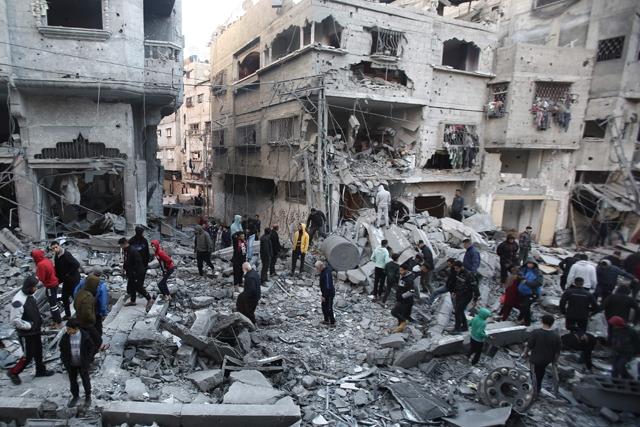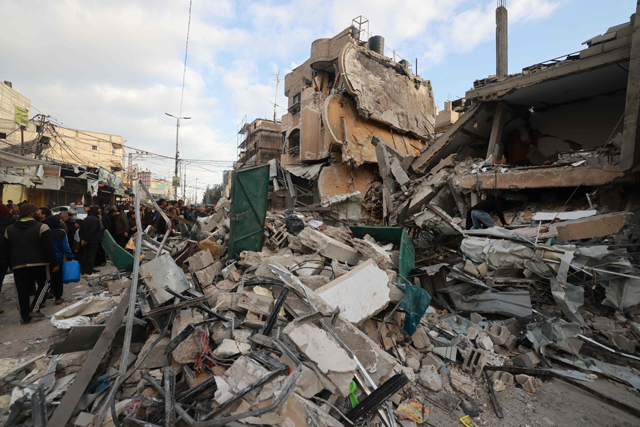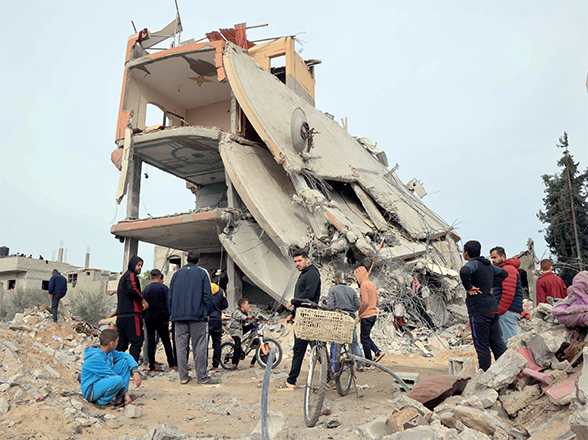You are here
WHO warns of 'critical shortages' in northern Gaza
By AFP - Nov 28,2024 - Last updated at Nov 28,2024

Palestinians inspect the damage at the site of an Israeli airstrike in the Nuseirat camp in central Gaza on November 27, 2024, amid the ongoing Israeli war on the Palestinian territory (AFP photo)
GENEVA — The WHO warned Thursday of dire shortages of medicines, food, shelter and fuel in Gaza, especially in the north, demanding that Israel allow in more aid and facilitate humanitarian operations.
The World Health Organisation described a "catastrophic" situation on the ground.
WHO chief Tedros Adhanom Ghebreyesus said that when the war in Gaza erupted more than a year ago following Hamas's deadly October 7 attack inside Israel, almost all of those displaced by the conflict sheltered in public buildings or with family members.
"Now, 90 percent are living in tents," he told a press conference at the WHO's headquarters in Geneva.
"This leaves them vulnerable to respiratory and other diseases, [while] cold weather, rain and flooding are expected to exacerbate food insecurity and malnutrition," he said.
The situation was particularly dire in the blockaded north, where a UN-backed assessment this month said famine looms.
The WHO and its partners this week conducted a three-day mission to the north, visiting more than a dozen health facilities.
Tedros said the team had seen "high number of trauma patients and increasing number of patients with chronic diseases needing treatment".
"There are critical shortages of essential medicines."
The WHO is "doing everything we can -- everything Israel allows us to do -- to deliver health services and supplies", he added.
Out of 22 requested missions to the north in November, only nine had been facilitated, Rik Peeperkorn, the WTO representative in the Palestinian territories, told reporters.
He said he hoped a planned mission on Saturday would go ahead to the only two remaining even "minimal" functioning hospitals in the north: Kamal Adwan and Al Awda.
"They are in need for everything," Peeperkorn said.
He described a dire lack of fuel especially, warning that "without fuel there are no humanitarian operations at all".
On a positive note, Peeperkorn said the WHO had facilitated this week the medical evacuation of 17 patients from Gaza to Jordan, 12 of whom would go on to the United States for treatment.
They were among nearly 300 patients who had been able to leave since Israel shuttered Gaza's main Rafah border crossing in early May, Peeperkorn said.
But around 12,000 patients are currently waiting in Gaza to be evacuated for medical reasons, he said, demanding medical corridors out of the territory.
"If we continue at this pace, we will be busy for the next 10 years," he said.
Related Articles
GENEVA — The head of the World Health Organisation (WHO) said on Sunday the health system in Gaza was being destroyed and reiterated his cal
GENEVA — An aid mission to two hospitals in northern Gaza found horrifying scenes of children dying of starvation, amid dire shortages of fo
GENEVA — There are no longer any functional hospitals in the north of the Gaza Strip, the World Health Organisation (WHO) said on Thursday,














